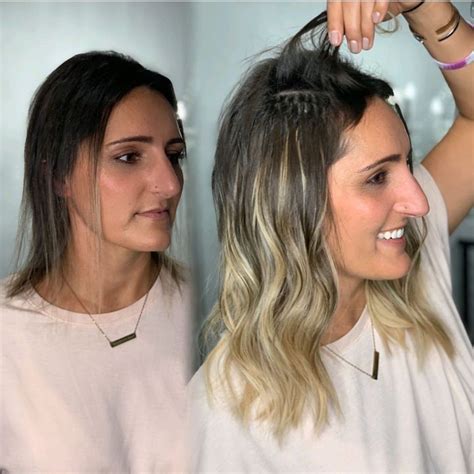Thinning hair affects an increasing number of people globally. According to the American Hair Loss Association, approximately 35 million women in the United States experience female pattern hair loss. This condition can significantly impact self-esteem and confidence.

Hair Weaving: A Solution for Thin Hair
Hair weaving is a non-surgical method of adding volume and length to thin hair. By attaching real or synthetic hair extensions to your natural hair, you can create the illusion of thicker, fuller locks.
3-Step Guide to Hair Weaving
Step 1: Choose Hair Extensions
- Select hair extensions that match the color, texture, and length of your natural hair.
- Decide on the attachment method (clip-ins, tape-ins, sew-ins).
- Determine the amount of hair needed based on your desired volume and length.
Step 2: Prepare Your Natural Hair
- Wash and blow dry your hair completely.
- Divide your hair into sections to make the weaving process easier.
- Remove any tangles or knots to prevent breakage.
Step 3: Attach Hair Extensions
- Follow the specific instructions for your chosen attachment method.
- Start weaving the hair extensions into your natural hair close to the root.
- Blend the extensions seamlessly by alternating them with your natural hair.
Types of Hair Weaving
1. Clip-In Hair Extensions
- Temporary and easy to remove
- Less damaging than other methods
- Limited in length and volume options
2. Tape-In Hair Extensions
- Semi-permanent with an average lifespan of 6-8 weeks
- Create a more natural look than clip-ins
- Requires professional application and removal
3. Sew-In Hair Extensions
- Permanent and only removed by a professional
- Most time-consuming and expensive method
- Offers the greatest volume and length enhancement
Pros and Cons of Hair Weaving
Pros:
- Adds volume and length instantly
- Can boost self-confidence
- Provides styling versatility
Cons:
- Can be uncomfortable if not applied correctly
- Requires maintenance and regular touch-ups
- May damage natural hair if not done by a professional
Tips for Successful Hair Weaving
- Avoid over-washing and brushing to prevent breakage.
- Use gentle shampoos and conditioners.
- Sleep on a silk or satin pillowcase to reduce friction.
- Visit a professional regularly for maintenance and touch-ups.
- Utilize products like dry shampoo or volumizing mousse to enhance volume.
Conclusion
Hair weaving is a versatile solution for individuals seeking to transform their thin hair. By choosing the appropriate hair extensions, preparing your natural hair correctly, and following the proper attachment techniques, you can achieve fuller, longer locks that boost your confidence and enhance your overall appearance.
